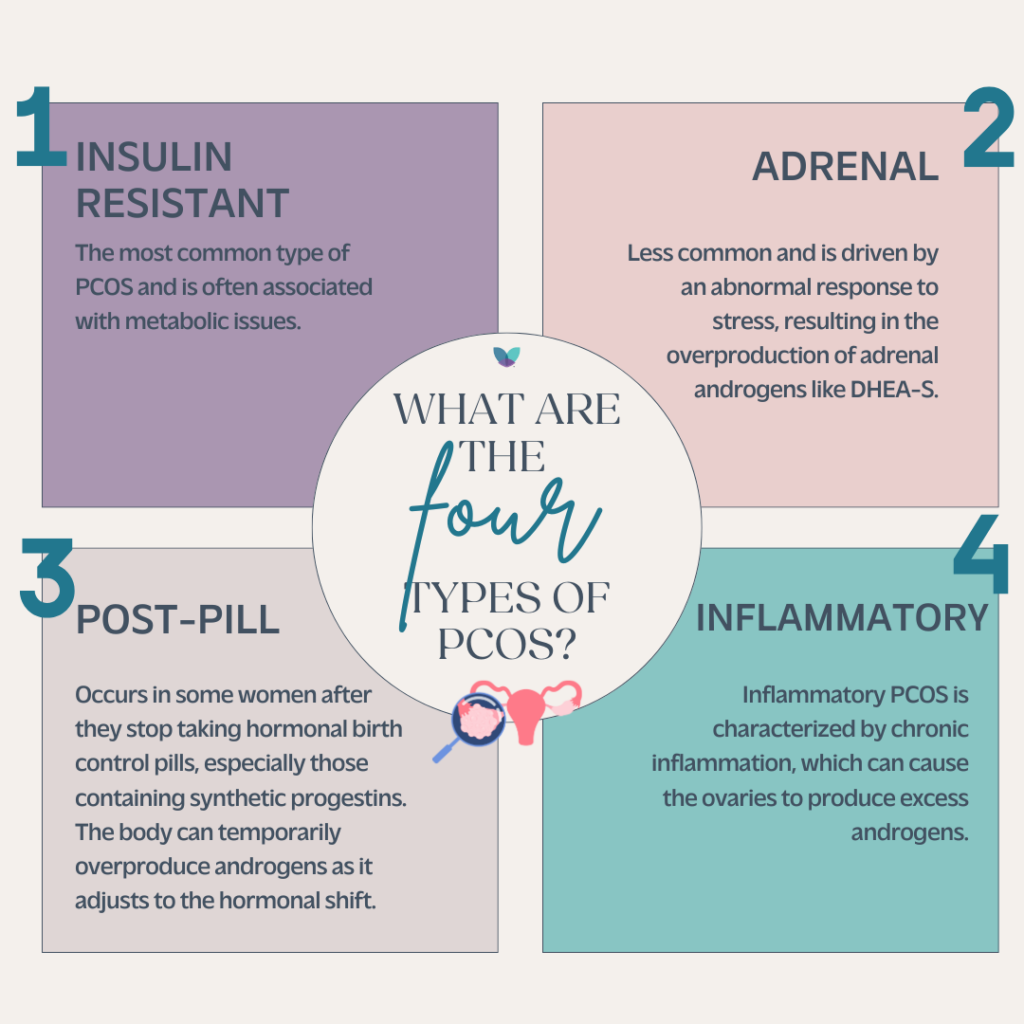What is PCOS?
Polycystic Ovary Syndrome (PCOS) is a common endocrine disorder affecting women of reproductive age. Despite its prevalence, PCOS is a complex condition that can manifest in various forms, making it challenging to diagnose and manage. Understanding the different types of PCOS can help individuals better navigate their symptoms and treatment options.

1. Insulin-Resistant PCOS
Insulin-Resistant PCOS is the most common type and is often associated with metabolic issues. This form of PCOS occurs when the body’s cells become resistant to insulin, a hormone that regulates blood sugar levels. As a result, the body produces more insulin to compensate, leading to high insulin levels, weight gain (especially around the abdomen), and difficulty losing weight. High insulin levels also stimulate the ovaries to produce more androgens (male hormones), which can cause symptoms like acne, excessive hair growth (hirsutism), and irregular menstrual cycles.
Symptoms of Insulin-Resistant PCOS:
– Weight gain, especially around the belly
– Acne and oily skin
– Irregular periods
– Hair thinning on the scalp
– Excessive hair growth on the face and body
2. Adrenal PCOS
Adrenal PCOS is less common and is driven by an abnormal response to stress, resulting in the overproduction of adrenal androgens like DHEA-S (dehydroepiandrosterone sulfate). This type of PCOS is not associated with insulin resistance or inflammation but is more related to the body’s stress response. Women with Adrenal PCOS may have normal levels of testosterone and androstenedione but elevated DHEA-S levels.
Symptoms of Adrenal PCOS:
– Elevated DHEA-S levels with normal testosterone and androstenedione levels
– Anxiety or feeling “wired” but tired
– Irregular menstrual cycles
– Acne and oily skin
– Hair thinning on the scalp
3. Post-Pill PCOS
Post-Pill PCOS occurs in some women after they stop taking hormonal birth control pills, especially those containing synthetic progestins. The body can temporarily overproduce androgens as it adjusts to the hormonal shift, leading to PCOS-like symptoms. This type of PCOS is often temporary and can resolve itself within a few months.
Symptoms of Post-Pill PCOS:
– Irregular or absent periods after stopping birth control
– Acne flare-ups
– Hair loss or thinning
– Excessive hair growth on the face and body
4. Inflammatory PCOS
Inflammatory PCOS is characterized by chronic inflammation, which can cause the ovaries to produce excess androgens. Inflammation can also lead to symptoms like fatigue, skin issues (e.g., eczema), headaches, joint pain, and digestive problems. Women with this type of PCOS may have elevated inflammatory markers, such as C-reactive protein (CRP), in their blood tests.
Symptoms of Inflammatory PCOS:
– Chronic fatigue
– Skin conditions like eczema or acne
– Headaches or migraines
– Bowel issues (e.g., irritable bowel syndrome)
– Unexplained joint pain
Management Strategies:
Reducing inflammation through diet and lifestyle changes is crucial for managing Inflammatory PCOS. Anti-inflammatory diets rich in fruits, vegetables, omega-3 fatty acids, and whole grains can help. Identifying and addressing food sensitivities, managing stress, and getting adequate sleep are also important. Supplements such as omega-3s, turmeric, and antioxidants may provide additional support.
Download our anti-inflammatory cookbook here
At Pelvic Rehabilitation Medicine, we help our PCOS patients reduce inflammation with treatment through the PRM Protocol™, a proprietary, patented, simple, office-based procedure to treat the symptoms of chronic abdominal pelvic pain by a direct treatment of inflamed pelvic nerves and spastic pelvic muscles which are often the root cause of symptoms.
Identifying Your PCOS Type
Understanding which type of PCOS you have is crucial for determining the most effective treatment approach. A comprehensive evaluation by a healthcare provider, including blood tests and a detailed assessment of symptoms, can help identify your PCOS type. Remember, it’s possible to have a combination of PCOS types, requiring a more tailored approach.

Getting A Diagnosis & Finding Care
Understanding which type of PCOS you have is crucial for determining the most effective treatment approach. A comprehensive evaluation by a healthcare provider and a detailed assessment of symptoms, can help identify your PCOS type.
PCOS is a complex condition that can manifest in different ways, but understanding the distinct types can empower women to take control of their health. If you are struggling with pelvic pain and believe you are experiencing the symptoms of PCOS, schedule an appointment with a pelvic pain specialist.
Schedule With A Pelvic Pain Specialist
If you are experiencing the symptoms of PCOS without pelvic pain, we recommend consulting a healthcare provider specializing in hormonal health to develop a personalized treatment plan. With the right approach, it is possible to manage PCOS symptoms and improve your quality of life.
